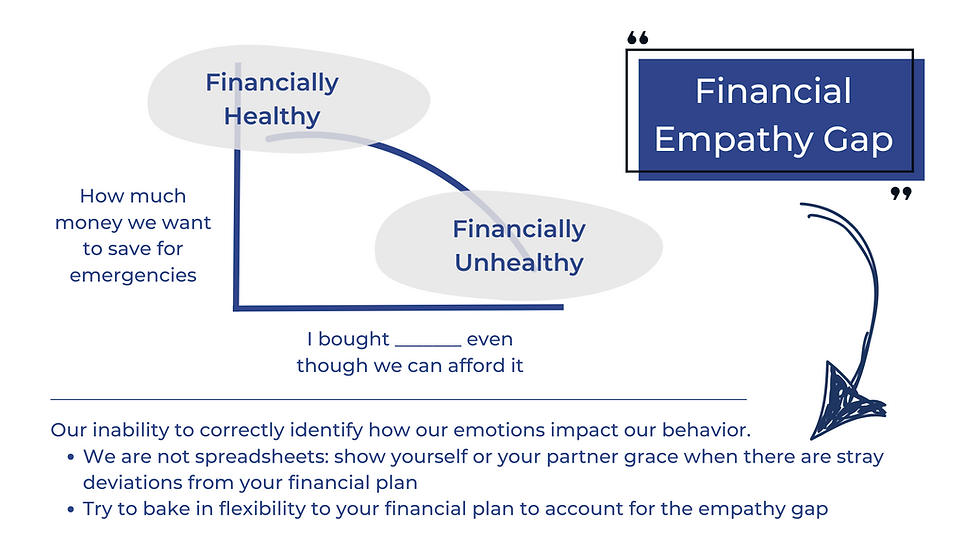5 Money Habits That Strengthen Relationships, According to Research
- Brian Page

- Sep 4, 2025
- 4 min read

When couples argue about money, it’s often about how much is being spent or who’s doing the spending. But research reveals something deeper. How couples manage money together plays a major role in their overall happiness and relationship quality.
A 2020 study looked at over 500 couples and found a clear link. Specific money habits predict both life satisfaction and how strong a couple feels as a team. So if you're wondering how to feel more secure and connected in your relationship, the answer might just be in your budget or your credit card statement.
Let’s unpack the key insights and translate them into daily habits you can use with your partner starting today.
What the Study Found (In Plain English)
Researchers studied married and cohabiting couples in Poland, using a type of artificial intelligence called artificial neural networks to spot patterns between money behavior and well-being. The goal was to understand how different financial choices like budgeting, saving, credit use, and insurance planning relate to life satisfaction and relationship quality.
The findings are simple but powerful:
Couples who handle their daily finances well like budgeting, saving, and paying bills tend to feel happier overall.
Couples who manage debt and plan for the future especially with credit and insurance tend to have stronger, healthier relationships.
In other words, the way you and your partner manage money isn’t just about dollars and cents. It’s about trust, teamwork, and long-term connection.
5 Money Habits That Strengthen Relationships
1. Daily Money Management = More Life Satisfaction
Couples who track spending, create budgets, and stick to saving goals consistently report higher levels of life satisfaction. Why? Because financial clarity brings peace of mind. And peace of mind makes space for joy.
When both partners feel in control of their finances, stress decreases. It’s not about how much you earn. It’s about how well you manage what you have. Even small acts, like reviewing your checking account together once a week, can increase your sense of stability.
Pro Tip: Have a 15-minute “money date” once a week. Use it to review your spending, plan for upcoming bills, or celebrate a win such as paying off a credit card. Light a candle. Pour a drink. Make it feel like teamwork, not tension.
2. Credit and Insurance Habits Strengthen Relationships
The study also found that smart credit habits such as avoiding late payments and reducing debt and having insurance such as life or home coverage beyond what’s required were tied to stronger relationships.
Why? Because these behaviors communicate long-term thinking. They say, “I’m planning for us, not just me.” When partners take future planning seriously, it builds trust and deepens commitment.
Pro Tip: Sit down together and pull your free credit reports. Review them without blame. Talk about what changes you'd like to make. Then check your insurance coverage. Do you have life insurance? Renter’s insurance? If not, explore your options. It’s not morbid. It’s mature love.
3. Avoid the “Harsh Start-Up” in Money Talks
The study also looked at how couples talk about money and found that the way conversations begin matters. Entering a money conversation with frustration or criticism sets the tone for conflict. Relationship experts like Dr. John Gottman call this a “harsh start-up,” and it’s a major predictor of relationship strain.
The fix? Start gently. Ask questions. Assume good intentions. Instead of “Why did you spend so much on Amazon again?” try “Can we look at how our spending is tracking this month?”
Pro Tip: Before a financial conversation, agree to a few shared ground rules. These could include no interrupting, no blame, and no multitasking. Borrow from the Fair Play Method and schedule check-ins where one partner holds the “card” for the task and fully owns the conversation.
4. Align on Shared Goals to Stay Close
Couples who agree on financial goals such as saving for a home, taking a vacation, or becoming debt-free tend to feel more satisfied in their relationship. These shared goals act as relationship glue. They keep both people pulling in the same direction.
But here’s the catch. You won’t know what goals you share until you talk about them.
Pro Tip: Make a “Dreams & Dollars” list. Each of you writes down three things you want to achieve with your money in the next one to three years. Compare notes. Where do you overlap? Where can you compromise? Then build a basic plan to get there together.
Financial Habits Are Acts of Love
Managing money together isn’t just about responsibility. It’s about respect. It says, “I care about our future, and I want to plan it with you.” The research shows that small, everyday financial choices have a big impact on happiness and connection.
So budget together. Pay off that debt. Buy the insurance. Schedule a money date. Not because you “should” but because every act of teamwork in money is an act of love in your marriage.
Professional Support

I support couples who want to better manage money or the home as a team in their relationship.
I'm an Accredited Financial Counselor® and Fair Play Facilitator®, empowering high-achieving couples with systems to manage money and the home as a team — drawn from decades of national leadership and lived experience.
Contact me to set up a free 15 minute exploratory call.

